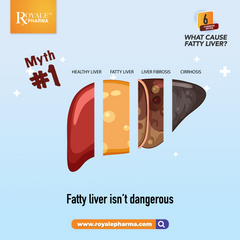
Breaking Down 6 Common Myths of Fatty Liver Disease
- Health Hub 101, Taboo Topic
- 28 Oct, 2022
Unlike the stomach, intestines, heart, and lungs, few people understand what the liver performs. Here, we debunk several popular urban legends.

Myth 1: A fatty liver is not harmful
Many individuals with fatty liver are unaware that they have the illness. Sometimes, it produces no problems at all. However, this does not mean you should disregard it. Why? This is because an accumulation of fat induces liver cell damage and inflammation.
The liver is the only organ capable of self-regeneration by replacing old, damaged cells with new ones. As the liver attempts to eliminate fat, scar tissue develops, making it difficult for the liver to carry nutrients throughout the body and raising the pressure in the veins surrounding the liver. Over time, fatty liver can increase the chance of developing more serious illnesses, such as cirrhosis (liver scarring), liver disease, and liver cancer.

Myth 2 : Alcohol is the principal cause of fatty liver
There are multiple causes of fatty liver, and excessive alcohol consumption is just one of them. Consuming alcohol more than the recommended 'safe limit' may increase your chance of developing a fatty liver.
The safe weekly alcohol consumption limit for men and women is 14 units, where one unit of alcohol is equivalent to one small glass of wine (125ml), one shot of strong liquor, or one half-pint of beer.

Myth 3: Drinking liquor is more harmful to the liver than beer or wine.
Contrary to popular opinion, it makes no difference what type of alcohol you consume; what matters is how much you consume.
The weekly safe limit is 14 units, where under this threshold, alcoholic fatty liver is less prone to develop.

Myth 4 : Fatty liver disease is an uncommon disorder.
Unfortunately, the prevalence of fatty liver is increasing worldwide. In many nations, unhealthy diets, binge drinking culture, and a higher prevalence of obesity may be contributing causes.
25 to 30 percent of the general population may have fatty liver, and 15 percent of these individuals have the more severe kind that can lead to cirrhosis and cancer.
As fatty liver disease is more prevalent than you may believe, it is essential to modify your lifestyle to lower your risk of having the condition.

Myth 5: Fatty liver disease is incurable.
Although there is no medication available to treat fatty liver, certain lifestyle adjustments can prevent the illness from worsening and even reverse it.
As fatty liver is related with certain health disorders such as diabetes and high cholesterol, avoiding alcohol and maintaining a healthy weight can help prevent additional damage.
Some behavioral modifications that can lower the risk of fatty liver are:
- Avoid alcohol since it increases liver stress.
- Reduce your sugar consumption
- Eliminate fatty foods and adopt a plant-based diet to maintain healthy levels of cholesterol and triglycerides.
- Exercise regularly
- Uphold a healthy weight
- Observe your glucose levels
- If you are overweight or obese, you should aim to lose weight by consuming fewer calories and engaging in more physical exercise.
- Keeping a nutritious diet rich in fresh fruits, vegetables, whole grains, and lean meats such as chicken and fish

Myth 6 : Women are more likely to acquire fatty liver than males.
Men and women are both susceptible to acquiring fatty liver disease.
While this was once believed to be the case, current studies indicate that both men and women have an equal risk
Article referenced from Dr Lui Hock Foong, gastroenterologist at Gleneagles Hospital
References:
(10 August 2017) Fatty Liver (Hepatic Steatosis). Retrieved 6 July 2018 from https://www.healthline.com/health/fatty-liver#symptoms
(2 March 2018). What Does the Liver Do? Retrieved 6 July 2018 from https://www.medicalnewstoday.com/articles/305075.php
Cirrhosis (7 December 2018) Retrieved 21 September 2020, from https://www.mayoclinic.org/diseases-conditions/cirrhosis/symptoms-causes/syc-20351487
(n.d.) Non-alcoholic Fatty Liver Disease & NASH. Retrieved 21 September 2020, from https://www.niddk.nih.gov/health-information/liver-disease/nafld-nash
(29 August 2019) Nonalcoholic Fatty Liver Disease. Retrieved 21 September 2020, from https://www.mayoclinic.org/diseases-conditions/nonalcoholic-fatty-liver-disease/diagnosis-treatment/drc-20354573
(18 May 2021) Liver cancer. Retrieved 29 November 2021 from https://www.mayoclinic.org/diseases-conditions/liver-cancer/symptoms-causes/syc-20353659
(18 May 2021) Liver cancer. Retrieved 29 November 2021 from https://www.mayoclinic.org/diseases-conditions/liver-cancer/symptoms-causes/syc-20353659
(31 July 2020) Fatty Liver Disease. Retrieved 29 November 2021 from https://my.clevelandclinic.org/health/diseases/15831-fatty-liver-disease#management-and-treatment
(31 July 2020) Fatty Liver Disease. Retrieved 15 December 2021 from https://my.clevelandclinic.org/health/diseases/15831-fatty-liver-disease


